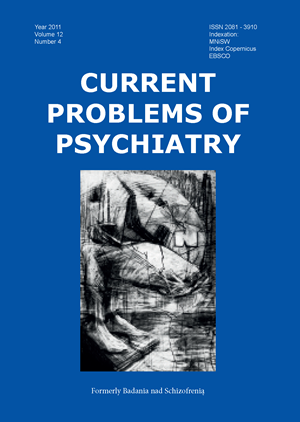Zaburzenia osobowości a styl przywiązania u osób w bliskich związkach partnerskich
Słowa kluczowe:
zaburzenia osobowości, styl przywiązania, związkiAbstrakt
Celem pracy było udzielenie odpowiedzi na następujący problem badawczy: Czy osoby z zaburzeniami osobowości będą w mniejszym stopniu przejawiały bezpieczny styl przywiązania, a w większym stopniu styl lękowo-ambiwalentny lub styl unikowy?
Grupa badana i metody badawcze: W badaniu wzięły udział 134 osoby: 67 kobiet i 67 mężczyzn. Wszystkie osoby w chwili przystąpienia do badania deklarowały, że są w bliskim, romantycznym związku z partnerem, z którym to zgłosiły się do badania. Badani byli w wieku od 18 do 32 lat. Średni staż związku badanych par wynosił około 3 lat.
W pracy zastosowano: Ankietę Osobową, Kwestionariusz Styl Życia 05-SK Ewy Trzebińskiej do badania zaburzeń osobowości według teorii doświadczeniowo-analitycznej oraz Kwestionariusz Stylów Przywiązaniowych (KSP) Mieczysława Plopy, który wyróżnia trzy style: bezpieczny, lękowo-ambiwalenty i unikowy.
Wyniki i wnioski: Przeprowadzone analizy statystyczne ujawniły istotne korelacje między zaburzeniami osobowości a stylem przywiązania. Potwierdzono hipotezę iż, osoby z wyższymi wynikami dotyczącymi zaburzeń osobowości posiadają w mniejszym stopniu bezpieczny styl więzi oraz wykazują większe natężenie stylu lękowo-ambiwalentego oraz stylu unikowego. W zależności od tego jakie zaburzenie osobowości jest przejawiane (z danej grupy zaburzeń chaotycznych, ambiwalentnych bądź wielkościowych) odpowiednio wiązało się to z większym nasileniem danego stylu lękowo-ambiwalentego bądź unikowego.
Bibliografia
1. American Psychiatric Association. Diagnostic and statistical manual of mental disorders. 4th ed., Text Revision. American Psychiatric Association; Washington (DC): 2000.
2. Bilikiewicz A. (red). Psychiatria. Podręcznik dla studentów medycyny. Warszawa; Państwowy Zakład Wydawnictw Lekarskich: 2006.
3. Trzebińska E. (red.). Szaleństwo bez utraty rozumu: z badań nad zaburzeniami osobowości. Warszawa; Academica Wydawnictwo SWPS: 2009.
4. Carson R., Butcherr J.N., Mineka S. Psychologia zaburzeń. Gdańsk; Gdańskie Wydawnictwo Psychologiczne: 2005.
5. Schore A. Zaburzenia regulacji prawej półkuli mózgowej: podstawowy mechanizm traumatycznego przywiązania i psychopato genezy stresowego zaburzenia pourazowego. Warszawa; Instytut Psychiatrii i Neurologii: 2009.
6. Aronson E., Wilson T.D., Akert R.M. Psychologia społeczna. Serce i umysł. Poznań; Zysk S-ka: 1997.
7. Wojciszke B. Człowiek wśród ludzi. Zarys psychologii społecznej. Warszawa; Wydawnictwo Naukowe „Scholar”: 2004.
8. Westen D. Status naukowy procesów nieświadomych. Warszawa; Instytut Psychiatrii i Neurologii: 2009.
9. Plopa M. Więzi w małżeństwie i rodzinie. Metody badań. Kraków; Oficyna Wydawnicza „Impuls”: 2008


